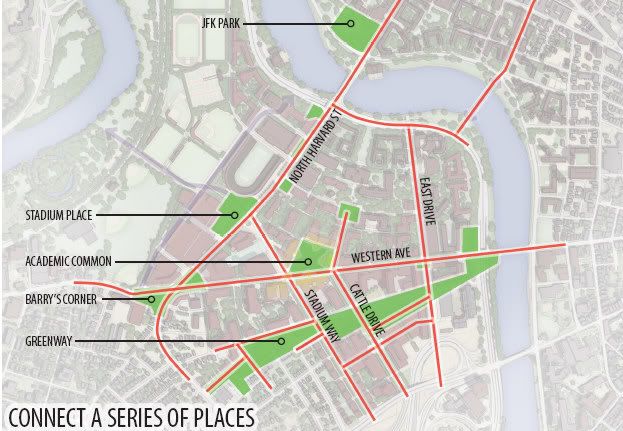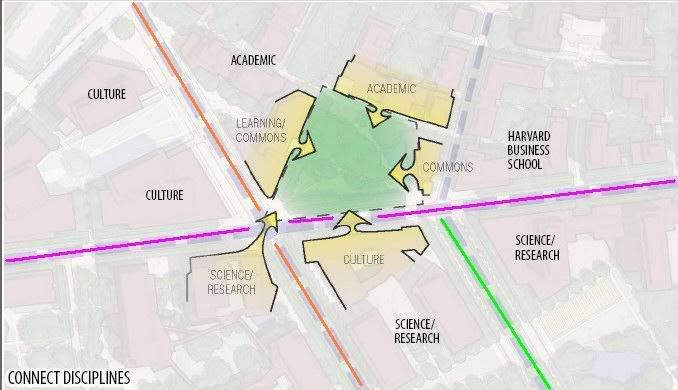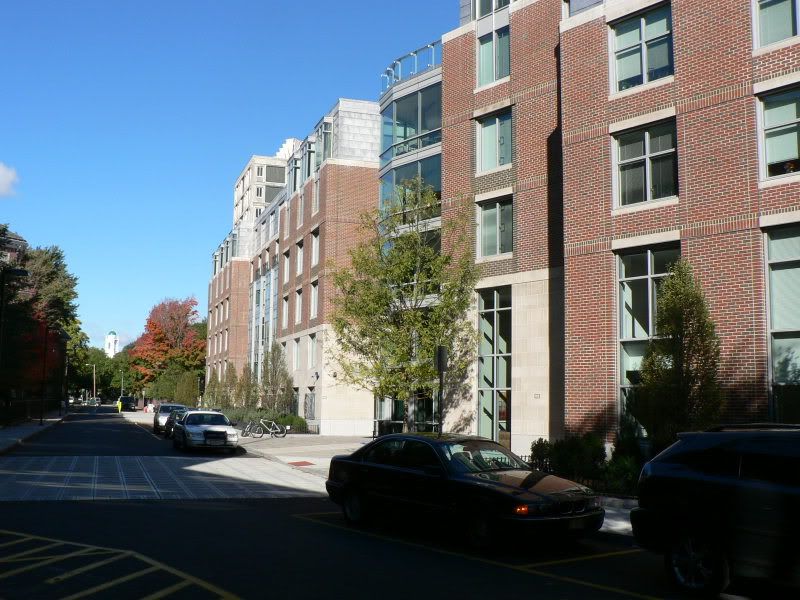You are using an out of date browser. It may not display this or other websites correctly.
You should upgrade or use an alternative browser.
You should upgrade or use an alternative browser.
Harvard - Allston Campus
- Thread starter statler
- Start date
stellarfun
Senior Member
- Joined
- Dec 28, 2006
- Messages
- 5,676
- Reaction score
- 1,480
Some additional renderings and sketches.
IMO, the Allstonites have a legitimate beef as Harvard's current consultant planner did not prepare consistent designs for particular areas. For example, for Barry's Corner, first the rendering which has a mid-rise next to the Smith Fields playground, followed by a massing study (mid-rise chopped?) looking SW from Barry's Corner, followed by what would seem to be the site plan, which looks to be latest and most detailed version. The new hockey rink, basketball arena, and swimming pool are shown.



Harvard's proposed road net.

Marked version of the road net, showing massing. Blue is Windom St., an existing street that currently winds to the east of the under construction science complex to connect with Western Ave. Orange is a new street, Stadium Way, which was first proposed in the first draft of the IMP. Green is another new street, Cattle Drive. (This street is new to this version of the IMP. Were there once stockyards in Allston, or is this some sort of pun for what Harvard intends doing to Allston residents?) Lavender is Western Ave.

A new feature in this iteration of the IMP is an area called the commons. It would be located near where the brick building that used to be the New England Book Depository now stands on the north side of Western Ave., east of the Charlesview Apts. I think this is a hokey title: what is the difference between a quad in Harvard Yard and this commons? What is new to this version is the addition of a fourth cultural building to this area of the Allston campus.


Homeoiwners along Windom St. have voiced complaints about Harvard affiliated housing being built in their backyards. (Windom St. in blue.)

This last sketch appeasrs to indicate space that Harvard would devote to retail / commercial along N. Harvard St. between Barry's Corner and Harvard Sq. A solid idea, and much more preferable than the retail / commercial frontage flanking Western Ave eastward from Barry's Corner to Cambridge that some had proposed earlier.

IMO, the Allstonites have a legitimate beef as Harvard's current consultant planner did not prepare consistent designs for particular areas. For example, for Barry's Corner, first the rendering which has a mid-rise next to the Smith Fields playground, followed by a massing study (mid-rise chopped?) looking SW from Barry's Corner, followed by what would seem to be the site plan, which looks to be latest and most detailed version. The new hockey rink, basketball arena, and swimming pool are shown.



Harvard's proposed road net.

Marked version of the road net, showing massing. Blue is Windom St., an existing street that currently winds to the east of the under construction science complex to connect with Western Ave. Orange is a new street, Stadium Way, which was first proposed in the first draft of the IMP. Green is another new street, Cattle Drive. (This street is new to this version of the IMP. Were there once stockyards in Allston, or is this some sort of pun for what Harvard intends doing to Allston residents?) Lavender is Western Ave.

A new feature in this iteration of the IMP is an area called the commons. It would be located near where the brick building that used to be the New England Book Depository now stands on the north side of Western Ave., east of the Charlesview Apts. I think this is a hokey title: what is the difference between a quad in Harvard Yard and this commons? What is new to this version is the addition of a fourth cultural building to this area of the Allston campus.


Homeoiwners along Windom St. have voiced complaints about Harvard affiliated housing being built in their backyards. (Windom St. in blue.)

This last sketch appeasrs to indicate space that Harvard would devote to retail / commercial along N. Harvard St. between Barry's Corner and Harvard Sq. A solid idea, and much more preferable than the retail / commercial frontage flanking Western Ave eastward from Barry's Corner to Cambridge that some had proposed earlier.

czsz
Senior Member
- Joined
- Jan 12, 2007
- Messages
- 6,043
- Reaction score
- 6
I think this is a hokey title: what is the difference between a quad in Harvard Yard and this commons?
As far as I can tell it's bordered by two "commons" buildings (Harvardian for student center) so it may allude to that. It might also be a transparent attempt to appeal to the community ("commons" sounds more public than "yard", which has the connotation of a private enclosure).
- Joined
- May 25, 2006
- Messages
- 6,991
- Reaction score
- 1,698
Way too much open space. You want Harvard Sq 2.0? This ain't it. This is suburban strip along Route 128 2.0
Seriously. What a snooze fest. Big blocky generic buildings with lots of green space in between. Let's see some interesting things, at LEAST on the main streets. Smaller buildings, MORE density, lots of retail, etc. Hopefully as the design evolves it will get better.
stellarfun
Senior Member
- Joined
- Dec 28, 2006
- Messages
- 5,676
- Reaction score
- 1,480
Allston north of the Mass Pike

Harvard-owned property west of N. Harvard St. (shown in red).

IMO, the key to retail and commercial development in the vicinity of Barry's Corner ultimately turns on:
a.) Harvard acquiring the WBZ property
b.) swapping some of the Smith field playground (tinted green) for the WBZ land and/or land further west on Western Ave, near the Olmstead stables shown in light blue (MDC-State owned).
c.) Harvard buying the Boston Skating Club property and relocating the BSC somewhere else to a new facility.
If a.) through c.) were to happen, Harvard (or somebody) could develop the north side of Western Ave from N. Harvard St. to the proposed new Charlesview site (shown as dark ochre) as a fairly robust retail and commercial center. It will never be Harvard Sq, nor Kenmore even, but it could be move lively than Kendall. However, Harvard is conspicuously silent about this property it owns (other than to say it does not plan using it for institutional buildings) which makes planning for a cohesive retail / commercial nexus in the vicinity of Barry's Corner very difficult.
The community is of little help either. There is strong opposition to density, a position which limits increasing the residential population, and with too few people, this will never be more than a neighborhood retail environment, and a fairly small one at that.
____________________
Some pictures of Harvard affiliated housing in Cambridge and Windom St. in Allston.
New graduate housing on Copperthwaite St. in Cambridge.

The common yard between the Copperthwaite St. housing and Harvard-owned housing on Grant St. in Cambridge. I suspect that the residents of Windom St. anticipate housing similar to Copperthwaite would be built abutting their backyards. And unless Harvard buys all the houses on Windom St., there would be no common yard.

The Great Wall of Allston fence at the southern end of Windom St. Harvard would build affiliated housing right to the sidewalk line in this location.

The Great Wall fence at the stub end of Hopedale St. from where it intersects Windom, showing the relative yard depth of Windom St houses.

Some in the Allston community insist that Harvard's Allston campus be open and freely accessible to all, and integrated with the community. This viewpoint may not be shared by the property owners of Windom St who appear to want Harvard to keep its distance and create buffers between their homes and Harvard's new buildings.

Harvard-owned property west of N. Harvard St. (shown in red).

IMO, the key to retail and commercial development in the vicinity of Barry's Corner ultimately turns on:
a.) Harvard acquiring the WBZ property
b.) swapping some of the Smith field playground (tinted green) for the WBZ land and/or land further west on Western Ave, near the Olmstead stables shown in light blue (MDC-State owned).
c.) Harvard buying the Boston Skating Club property and relocating the BSC somewhere else to a new facility.
If a.) through c.) were to happen, Harvard (or somebody) could develop the north side of Western Ave from N. Harvard St. to the proposed new Charlesview site (shown as dark ochre) as a fairly robust retail and commercial center. It will never be Harvard Sq, nor Kenmore even, but it could be move lively than Kendall. However, Harvard is conspicuously silent about this property it owns (other than to say it does not plan using it for institutional buildings) which makes planning for a cohesive retail / commercial nexus in the vicinity of Barry's Corner very difficult.
The community is of little help either. There is strong opposition to density, a position which limits increasing the residential population, and with too few people, this will never be more than a neighborhood retail environment, and a fairly small one at that.
____________________
Some pictures of Harvard affiliated housing in Cambridge and Windom St. in Allston.
New graduate housing on Copperthwaite St. in Cambridge.

The common yard between the Copperthwaite St. housing and Harvard-owned housing on Grant St. in Cambridge. I suspect that the residents of Windom St. anticipate housing similar to Copperthwaite would be built abutting their backyards. And unless Harvard buys all the houses on Windom St., there would be no common yard.

The Great Wall of Allston fence at the southern end of Windom St. Harvard would build affiliated housing right to the sidewalk line in this location.

The Great Wall fence at the stub end of Hopedale St. from where it intersects Windom, showing the relative yard depth of Windom St houses.

Some in the Allston community insist that Harvard's Allston campus be open and freely accessible to all, and integrated with the community. This viewpoint may not be shared by the property owners of Windom St who appear to want Harvard to keep its distance and create buffers between their homes and Harvard's new buildings.
Ron Newman
Senior Member
- Joined
- May 30, 2006
- Messages
- 8,395
- Reaction score
- 10
What is the purpose of that wall?
stellarfun
Senior Member
- Joined
- Dec 28, 2006
- Messages
- 5,676
- Reaction score
- 1,480
cden is right about the noise and dirt, but there's more to it.
The wall was requested by Allston residents, who then chose the final design from several different mockups. A new pair of mockups was recently constructed for an extension of the Wall on Western Ave across from the Charlesview. Charlesview residents are apparently unhappy with the construction fence and covered walkway currently in place.
However, the Great Allston Wall has been installed along part of the property perimeter where there are no homes. And construction of the Wall along the backyards of Windom St homes seems to be intended, at least for now, to control trespassing -- into or from the backyards -- onto Harvard land. I suspect there will be no construction in that area for a decade or more, as the next projects are likely to be sited north of Western Ave.
It would not be too much of a stretch to say that parts of the Great Allston Wall will last as long as the Berlin Wall.
The north end of the Wall at Windom St. (diagonally across the street from the Science complex construction site).

The Wall along the western side of the Science complex construction site, adjacent to a VW dealership which moved about a month ago to another location, so Harvard could gain control of the land that it owns.

The wall was requested by Allston residents, who then chose the final design from several different mockups. A new pair of mockups was recently constructed for an extension of the Wall on Western Ave across from the Charlesview. Charlesview residents are apparently unhappy with the construction fence and covered walkway currently in place.
However, the Great Allston Wall has been installed along part of the property perimeter where there are no homes. And construction of the Wall along the backyards of Windom St homes seems to be intended, at least for now, to control trespassing -- into or from the backyards -- onto Harvard land. I suspect there will be no construction in that area for a decade or more, as the next projects are likely to be sited north of Western Ave.
It would not be too much of a stretch to say that parts of the Great Allston Wall will last as long as the Berlin Wall.
The north end of the Wall at Windom St. (diagonally across the street from the Science complex construction site).

The Wall along the western side of the Science complex construction site, adjacent to a VW dealership which moved about a month ago to another location, so Harvard could gain control of the land that it owns.

Last edited:
czsz
Senior Member
- Joined
- Jan 12, 2007
- Messages
- 6,043
- Reaction score
- 6
Ominous email from Drew Gilpin Faust today: Harvard is likely to take a hit (whether from endowment losses or dropoffs in donations or government funding) from the financial crisis, and the Allston expansion looks like the best candidate for cost-cutting. Expect to see a slowdown, at least.
Harvard looks to tighten its belt
Wage, budget freeze could be among options
By Tracy Jan, Globe Staff | November 11, 2008
Even the world's richest university is feeling the pinch from the economic downturn.
Harvard's president, Drew Faust, said yesterday that the university is looking for ways to reduce spending across the campus, raising the specter of cuts to programs and compensation, as Harvard's endowment plummets. It is also assessing all aspects of its sweeping plan to expand across the Charles River in Allston, she said.
"We must recognize that Harvard is not invulnerable to the seismic financial shocks in the larger world," Faust wrote in an e-mail to faculty, staff, and students.
She did not specify what cuts were on the table and declined to be interviewed.
"The letter is the letter," said John Longbrake, university spokesman, who would not elaborate on the implications of Faust's e-mail. "Look, this is a serious situation, and they're planning and looking at things across the board."
A Harvard official familiar with its financial picture said the universi ty is considering imposing a wage freeze for administrators and faculty, as well as a budget freeze on all programs. The Faculty of Arts and Sciences, Harvard's largest faculty, is confronting a loss of roughly $4.5 billion in the market value of its endowment, which would translate to a net loss of $225 million from its budget, the official said on condition of anonymity because the plans are not final.
Harvard's move follows a range of belt-tightening at colleges and universities across the country.
Last month, Boston University instituted a hiring freeze and a moratorium on all construction projects that are not already underway. Yesterday, Dartmouth College said it was trimming its budget after its endowment lost $220 million during the turmoil. The New Hampshire school's endowment had finished the fiscal year at $3.66 billion. Brown and Cornell also imposed hiring freezes recently.
Harvard's endowment before the economic crisis was $36.9 billion. The money funded more than a third of the university's annual $3.5 billion operating budget.
Harvard officials would not say how much the endowment has lost in recent months, but Faust referenced a Moody's projection of a 30 percent decline in the value of college and university endowments this fiscal year. For Harvard, that would mean an $11 billion loss - that is, about $550 million in lost income.
Also under review are Harvard's expansion plans in Allston, Faust said. Construction projects that remain the highest priority include a $1 billion science complex in Allston and a law school addition in Cambridge, and renovations to the Fogg Museum.
Faust's letter laid out other financial challenges that Harvard faces, despite its great wealth.
The university cannot expect continued generous contributions from donors and foundations, she said. The pool of federal grant money for research is also at risk of drying up.
And any increase in tuition, which accounts for 20 percent of the university's revenue, should be kept modest during the tough economy, Faust said. It costs $47,215, including room and board, to attend Harvard, a 3.5 percent increase from last year.
Amid the financial storm, Faust affirmed Harvard's commitment to recent initiatives to expand financial aid for low- and middle-income families. Students from families making below $60,000 will still get a free ride, she said. And families making up to $180,000 per year can expect to pay no more than 10 percent of their income.
Some faculty members said Faust's letter, though sobering, did not come as a surprise.
"This strikes me as a drumbeat getting us ready to think in terms of a slowdown in growth, or even cuts and freezes," said Andrew Gordon, a history professor on Harvard's faculty council.
Michael Smith, dean of the Faculty of Arts and Sciences, was unavailable for comment. But he warned faculty and staff yesterday that everyone would be affected in the belt-tightening. The Faculty of Arts and Sciences draws more than half its operating expenses from the endowment.
"Given the prominence of endowment income in our finances, we must consider budgeting scenarios that significantly reduce our annual operating expenses," Smith wrote in an e-mail after Faust's letter.
Wilfried Schmid, a math professor who also serves on the faculty council, said Faust's reaction to the bleak economy is sensible.
"Nobody has any idea whether this is going to be a replay of the Great Depression," Schmid said in an interview. "Harvard is resilient enough to weather quite a storm, but exactly what this means, we'll have to see. Harvard is still the top university, and we'll do whatever's necessary to stay there."
Tracy Jan can be reached at tjan@globe.com.
Wage, budget freeze could be among options
By Tracy Jan, Globe Staff | November 11, 2008
Even the world's richest university is feeling the pinch from the economic downturn.
Harvard's president, Drew Faust, said yesterday that the university is looking for ways to reduce spending across the campus, raising the specter of cuts to programs and compensation, as Harvard's endowment plummets. It is also assessing all aspects of its sweeping plan to expand across the Charles River in Allston, she said.
"We must recognize that Harvard is not invulnerable to the seismic financial shocks in the larger world," Faust wrote in an e-mail to faculty, staff, and students.
She did not specify what cuts were on the table and declined to be interviewed.
"The letter is the letter," said John Longbrake, university spokesman, who would not elaborate on the implications of Faust's e-mail. "Look, this is a serious situation, and they're planning and looking at things across the board."
A Harvard official familiar with its financial picture said the universi ty is considering imposing a wage freeze for administrators and faculty, as well as a budget freeze on all programs. The Faculty of Arts and Sciences, Harvard's largest faculty, is confronting a loss of roughly $4.5 billion in the market value of its endowment, which would translate to a net loss of $225 million from its budget, the official said on condition of anonymity because the plans are not final.
Harvard's move follows a range of belt-tightening at colleges and universities across the country.
Last month, Boston University instituted a hiring freeze and a moratorium on all construction projects that are not already underway. Yesterday, Dartmouth College said it was trimming its budget after its endowment lost $220 million during the turmoil. The New Hampshire school's endowment had finished the fiscal year at $3.66 billion. Brown and Cornell also imposed hiring freezes recently.
Harvard's endowment before the economic crisis was $36.9 billion. The money funded more than a third of the university's annual $3.5 billion operating budget.
Harvard officials would not say how much the endowment has lost in recent months, but Faust referenced a Moody's projection of a 30 percent decline in the value of college and university endowments this fiscal year. For Harvard, that would mean an $11 billion loss - that is, about $550 million in lost income.
Also under review are Harvard's expansion plans in Allston, Faust said. Construction projects that remain the highest priority include a $1 billion science complex in Allston and a law school addition in Cambridge, and renovations to the Fogg Museum.
Faust's letter laid out other financial challenges that Harvard faces, despite its great wealth.
The university cannot expect continued generous contributions from donors and foundations, she said. The pool of federal grant money for research is also at risk of drying up.
And any increase in tuition, which accounts for 20 percent of the university's revenue, should be kept modest during the tough economy, Faust said. It costs $47,215, including room and board, to attend Harvard, a 3.5 percent increase from last year.
Amid the financial storm, Faust affirmed Harvard's commitment to recent initiatives to expand financial aid for low- and middle-income families. Students from families making below $60,000 will still get a free ride, she said. And families making up to $180,000 per year can expect to pay no more than 10 percent of their income.
Some faculty members said Faust's letter, though sobering, did not come as a surprise.
"This strikes me as a drumbeat getting us ready to think in terms of a slowdown in growth, or even cuts and freezes," said Andrew Gordon, a history professor on Harvard's faculty council.
Michael Smith, dean of the Faculty of Arts and Sciences, was unavailable for comment. But he warned faculty and staff yesterday that everyone would be affected in the belt-tightening. The Faculty of Arts and Sciences draws more than half its operating expenses from the endowment.
"Given the prominence of endowment income in our finances, we must consider budgeting scenarios that significantly reduce our annual operating expenses," Smith wrote in an e-mail after Faust's letter.
Wilfried Schmid, a math professor who also serves on the faculty council, said Faust's reaction to the bleak economy is sensible.
"Nobody has any idea whether this is going to be a replay of the Great Depression," Schmid said in an interview. "Harvard is resilient enough to weather quite a storm, but exactly what this means, we'll have to see. Harvard is still the top university, and we'll do whatever's necessary to stay there."
Tracy Jan can be reached at tjan@globe.com.
stellarfun
Senior Member
- Joined
- Dec 28, 2006
- Messages
- 5,676
- Reaction score
- 1,480
Ok, a wild-assed guess about what Harvard will do.
Continue with these projects:
> Finish Science Complex I without any delays.
> Finance the relocation of the Charlesview apartments. (Delaying constructing the replacement apartments would mean having to pay for repairs to the existing buildings.)
> Build a new basketball arena, hockey rink, and swimming pool. Tear down the existing venues, and build new undergraduate housing on the site. (Dillon is now to be spared, based on the current map.) I think Harvard needs to have this new housing as swing space as it undertakes total renovation of the older, antiquated residence houses.
> One or two new buildings for the Business School (which has its own large endowment and could fund such)..
> Continue acquiring land (and property) if it is on the market: e.g., WBZ.
Allston elements deferred indefinitely.
> The three or four new culture-related buildings, e.g., contemporary art museum, near Barry's Corner
> The new campuses for the School of Public Health and Graduate School of Education.
> New housing for Harvard graduate students, faculty, and other Harvard affiliated people.
> Science Complex II, though this might go ahead if there are enough capital gifts and/or grants to finance it. Science buildings can become revenue generators from licensing of research results produced by faculty within.
In Cambridge:
Another WAG:
> Continue rebuilding the Fogg. Too late to stop now.
> Finish the new law school building on Mass Ave.
> Defer reconstructing an older science building (38 Oxford) near the new NW Laboratory building.
> Continue planning and design work for renovating the undergraduate residence houses.
Continue with these projects:
> Finish Science Complex I without any delays.
> Finance the relocation of the Charlesview apartments. (Delaying constructing the replacement apartments would mean having to pay for repairs to the existing buildings.)
> Build a new basketball arena, hockey rink, and swimming pool. Tear down the existing venues, and build new undergraduate housing on the site. (Dillon is now to be spared, based on the current map.) I think Harvard needs to have this new housing as swing space as it undertakes total renovation of the older, antiquated residence houses.
> One or two new buildings for the Business School (which has its own large endowment and could fund such)..
> Continue acquiring land (and property) if it is on the market: e.g., WBZ.
Allston elements deferred indefinitely.
> The three or four new culture-related buildings, e.g., contemporary art museum, near Barry's Corner
> The new campuses for the School of Public Health and Graduate School of Education.
> New housing for Harvard graduate students, faculty, and other Harvard affiliated people.
> Science Complex II, though this might go ahead if there are enough capital gifts and/or grants to finance it. Science buildings can become revenue generators from licensing of research results produced by faculty within.
In Cambridge:
Another WAG:
> Continue rebuilding the Fogg. Too late to stop now.
> Finish the new law school building on Mass Ave.
> Defer reconstructing an older science building (38 Oxford) near the new NW Laboratory building.
> Continue planning and design work for renovating the undergraduate residence houses.
Last edited:
Looked for where it had been reported, but couldn't find it. So, where did the lions originate? And is there a picture?As has been reported, they found about a dozen lions...
stellarfun
Senior Member
- Joined
- Dec 28, 2006
- Messages
- 5,676
- Reaction score
- 1,480
Looked for where it had been reported, but couldn't find it. So, where did the lions originate? And is there a picture?
I see kz recently posted but may have missed ^.
I recall kz posting about the lions in the narrative of his conversation with a construction manager either from Turner or Harvard. I think the number of lions that were salvaged in good shape was a lot fewer than the dozen; that Harvard was going to research where the lions were originally from; and the lions were being stored in a warehouse (perhaps the one on Seattle St. next to the construction site).
Does that mean nobody knows?Harvard was going to research where the lions were originally from...
Were they planted by extra-terrestrials?
Are they really great lions, or are they garden-variety lions? Are they all the same?
Is there a picture?

